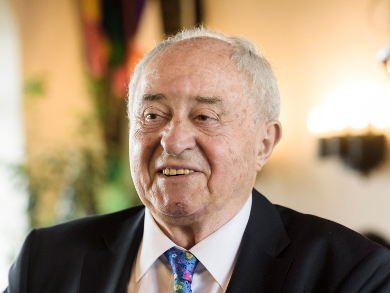I studied chemistry and chemical engineering at the Technical University of Darmstadt, Germany, from 1957 to 1962. During this time, I received an in-depth education in basic materials chemistry, as well as its application in heterogeneous catalysis and separation. During my Ph.D. and habilitation thesis between 1963 and 1969, my research focused on the synthesis of tailored silica particles with defined pore structures and morphologies and their surface modification.
This knowledge was urgently required in the emerging field of high performance liquid chromatography (HPLC), and I immediately started to work on the topic. The results allowed the production of highly efficient columns packed with 5 µm-sized porous n-octadecyl-bonded silica particles. The research and development of HPLC adsorbents and columns with tailored surface chemistries and different column formats remained my number one science focus for nearly five decades. It found applications in nanoscale liquid chromatography (nano-LC), capillary electrochromatography (CEC), and analytical, preparative, and process HPLC. The experience I gained led me to applications of HPLC in the pharmaceutical and chemical industries, in proteomics and peptidomics, searching for biomarkers in collaboration with pharmaceutical companies, clinics, and research institutions worldwide.
The activities are documented on my website and at www.CASSS.org. I am still active and write research articles, give lectures, and advise young scientists in the field of porous materials.
Photo: © fotostudio fischer, Weinheim, Germany
Klaus K. Unger received his Ph.D. from the Technical University Darmstadt, Germany, in 1965, finished his habilitation there in 1969, and was appointed as Assistant Professor of Chemistry. From 1976–2001, he was a Professor of Chemistry at the University of Mainz, Germany. From 2001–2009, he worked at the Merck KGaA, Darmstadt, Germany, as Senior Researcher in the field of bioseparation.
Among many other honors, Professor Unger has received the Pregl Medal by the Austrian Society for Analytical Chemistry in 1991, the A. J. P. Martin medal by the Royal Chromatography Society, London, UK, in 1993, the American Chemical Society (ACS) National Award for Chromatography in 1995, and the CASSS (California Separation Science Society) Annual Scientific Achievement Award in 2010 (see link to article below).
- HPLC Celebrates 50 Years overview page
with more personal stories and a wealth of free content
Also of Interest
- Today for Tomorrow,
ChemViews Mag. 26 June 2016.
Klaus Unger’s 80th Birthday Symposium at a castle overlooking the Rhine Valley looked into the future of materials sciences - Klaus Unger Received CASSS Prize,
ChemViews Mag. 09 November 2010.
Klaus K. Unger, Johannes Gutenberg University, Mainz, Germany, received CASSS Scientific Achievement Award - Celebrating the Career of Professor Klaus K. Unger,
Joseph J. Kirkland, Joseph J. DeStefano,
The Column 2016, 12(11).
About the important contributions Dr. Klaus Unger has made to chromatography



